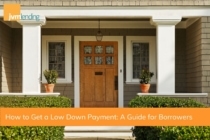
Investopedia, in fact, lists “six reasons to avoid PMI,” including: (1) Cost; (2) No Longer Tax Deductible; (3) Heirs Get Nothing Because It Is Not Benefits Insurance; (4) Hard To Cancel; and (5) Payment Is Permanent.
But – many of those “reasons” no longer exist or are vastly overstated.
PMI is insurance that conventional lenders require borrowers to obtain when their loan-to-value ratio is over 80%. It is called “private” mortgage insurance because it is provided by private insurance companies, in contrast to FHA’s mortgage insurance – which is provided by the government or HUD in particular.
It is important to remember that the insurance only protects the lender and not the borrower. If a borrower defaults or ends up in foreclosure, the PMI provider will make only the lender whole and provide no other benefits.
PMI payments can be made with monthly premiums, a single upfront premium, or a combination of both.
According to the internet (an “evil competitor’s” website I don’t dare link to 😊), over 2 million people obtained MI in 2020 alone.
PMI earned the unfair rap in the 1990s because it was much more expensive, much less regulated, and much tougher to eliminate.
Nowadays, however, it is far cheaper and much easier to eliminate.
So, despite its unfair stigma, PMI remains alive and well. This is for a good reason too, because sometimes PMI is the best option of all.
FAR CHEAPER NOW
PMI is far cheaper now because there is more competition; because the providers use algorithms that reward strong borrowers; and because the providers are just much more efficient in general.
For strong borrowers, PMI is amazingly cheap.
Below are some premiums for a hypothetical $800,000 purchase.
85% LTV ($680,000 loan): 0.12% per year or $68 per month.
90% LTV ($720,000 loan): 0.18% per year or $108 per month.
95% LTV ($760,000 loan): 0.26% per year or $165 per month.
EASIER TO ELIMINATE
Here is a blog I repeat often that sets out the three options for eliminating PMI: (1) refinancing; (2) paying down loan to 80% LTV; or (3) proving home has appreciated.
Eliminating PMI was much more difficult in the 1990s, but regulations imposed years ago have made it far easier.
FASTER CLOSES
Another benefit of PMI is that it does not slow down closes (like a 2nd mortgage or a HELOC does), particularly if there is an appraisal shortfall. We can close loans with PMI in 14 calendar days still, but we need 21 days or more to close a loan with HELOC.
APPRAISAL SHORTFALLS
This was the entire impetus of this blog, as our ARCH MI rep replied to my blog about appraisal shortfalls and reminded me that PMI is a great way to save deals!
If an appraisal comes in low, cash-starved buyers (who do not have the cash to cover a shortfall) can simply increase their LTV and take a loan with PMI in many cases.
Even better, sometimes they can get a seller credit to cover a lump-sum PMI payment so there will be no impact on the buyers.
SAVING DEALS WITH TIGHT DEBT-TO-INCOME RATIOS
If borrowers have LTVs over 80% and tight debt ratios, lump-sum PMI can again be employed to save transactions because lump-sum PMI can offer a lower overall payment than monthly PMI or a HELOC/2nd mortgage option.
LOWER RATES
Some lenders offer lower rates for an 85% LTV (or higher) loan with PMI than they do for 80% LTV loans with no PMI, as loans with PMI are effectively safer in some cases. This is a factor that few borrowers take into account when they obtain PMI.
Anyway – PMI hardly deserves its old stigma, as it is often a great option that can save money and even transactions overall!
Join our mailing list to receive daily industry insights:
Sign up to receive our blog daily
Jay Voorhees
Founder/Broker | JVM Lending
(855) 855-4491 | DRE# 1197176, NMLS# 310167
























